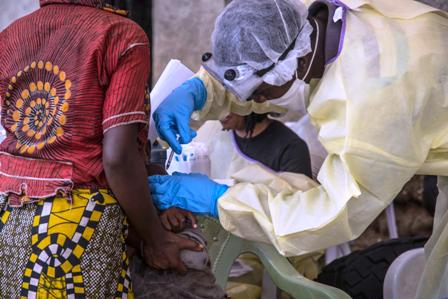“Getting the Ebola vaccine has given me a deep sense of security and will allow me to concentrate fully on my work,” says Chrysostome Kavusa Mwenderwa, a health care worker at Kalunguta Referral Hospital in Beni, in the Democratic Republic of the Congo.
Kavusa, 42, is among 18 748 frontline and health care workers in 12 health zones of the Democratic Republic of the Congo’s North Kivu province who were vaccinated against Ebola between June and September 2023, part of a drive by World Health Organization (WHO) in support of countries to help boost epidemic preparedness, and save lives.
“Health care workers are responsible for preventing disease, responding to outbreaks, and mitigating risk in communities. But the nature of their work puts them at increased risk for deadly infectious diseases such as Ebola, so preventive vaccination is crucial wherever possible,” says Dr Boureima Hama Sambo, WHO Representative in the Democratic Republic of the Congo.
Along with supporting preparedness efforts, Ebola vaccination also helps strengthen health systems, paving the way for adult vaccination programmes, Sambo adds.
“We have leveraged professional associations of physicians, nurses, midwifes and laboratory technicians, as well as of Ebola survivors, along with education and religious bodies and humanitarian partners, to encourage prophylactic vaccination for frontline and health care workers,” says Dr Nanou Yanga Mukadi, Cholera Vaccination Focal Point and EPI Ebola Vaccination Officer.
“Planning begins at grassroots level, with support from the intermediate and central levels and from partners, including WHO. One important aspect to highlight is awareness-raising. In addition, in-process and end-of-process monitoring is carried out to ensure that the targets are met,” Mukadi adds.
Along with Democratic Republic of the Congo, Guinea-Bissau and Uganda have also begun preventive vaccination efforts. WHO urges other countries at high risk to also consider preventive Ebola vaccination.
Ebola is a severe and often fatal illness, with death rates of 70% to 90% when untreated. The 2014–2016 outbreak in West Africa devastated communities and health services alike. WHO is encouraging countries to prioritize the use of the vaccine as a powerful public health tool to protect health care workers and other frontline service providers at high risk of exposure.
In 2023, WHO made a total of 111 497 doses of the ERVEBO® vaccine from the global stockpile available to high-risk African countries, with the aim of ramping up country preparedness for future outbreaks. WHO also supported the government of the Democratic Republic of the Congo to plan and coordinate preventive Ebola vaccination activities at operational and strategic levels.
Health care worker Kavusa Mwenderwa explains the threat from the Ebola virus: “Ebola is transmitted through contact with an infected patient’s blood or bodily fluids, or even through contact with clothing or bed linen contaminated with bodily fluids. Given the nature of our work, the risk to us as health workers is high.”
During early phases of an Ebola virus outbreak, health care workers are often first affected, which can lead to unnecessary deaths, staff shortages, and transmission to other patients.
His colleague, Remacle Kasereka Kitutu, 40, agrees: “The importance of getting vaccinated cannot be overemphasized. If we as health workers are vaccinated against Ebola, we can work much more efficiently and effectively, while continuing to take all the recommended precautions to avoid infection.”
Courtesy: WHO Africa

